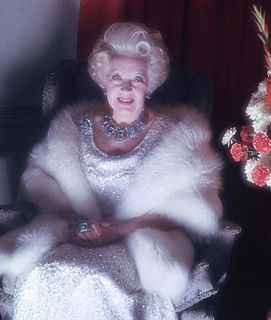A Quote by Seneca the Younger
I can see clothes of silk, if materials that do not hide the body, nor even one's decency, can be called clothes. ... Wretched flocks of maids labor so that the adulteress may be visible through her thin dress, so that her husband has no more acquaintance than any outsider or foreigner with his wife's body.
Related Quotes
She expected the pain, when it came. But she gasped at its sharpness; it was not like any pain she had felt before. He kissed her and slowed and would have stopped. But she laughed, and said that this one time she would consent to hurt, and bleed, at his touch. He smiled into her neck and kissed her again and she moved with him through the pain. The pain became a warmth that grew. Grew, and stopped her breath. And took her breath and her pain and her mind away from her body, so that there was nothing but her body and his body and the light and fire they made together.
My mom let me play in her clothes, wear makeup, and I had high heels from a thrift store. My mom tells me that the only reason she let me dress in her clothes is because she couldn't afford any toys, and it seemed entertaining enough and kept her from having to buy me anything, 'cause everything I wanted was in her makeup box or wardrobe.
She was the only doctor's wife in Branford, Maine, who hung her wash on an outdoor clothesline instead of putting it through a dryer, because she liked to look out the window and see the clothes blowing in the wind. She had been especially delighted, one day, when one sleeve of the top of her husband's pajamas, prodded by the stiff breeze off the bay, reached over and grabbed her nightgown around the waist.
Morally a woman has a right to the free and entire development of every faculty which God has given her to be improved and used to His honor. Socially she has a right to the protection of equal laws; the right to labor with her hands the thing that is good; to select the kind of labor which is in harmony with her condition and her powers; to exist, if need be, by her labor, or to profit others by it if she choose. These are her rights, not more nor less than the rights of the man.
Husbands are not Christ. But they are called to be like him. And the specific point of likeness is the husband's readiness to suffer for his wife's good without threatening or abusing her. This includes suffering to protect her from any outside forces that would harm her, as well as suffering disappointments of abuses even from her. This kind of love is possible because Christ died for both husband and wife. Their sins are forgiven. Neither needs to make the other suffer for sins. Christ has borne that suffering. Now as two sinful and forgiven people we can return good for evil.
I have to admit that one of the saddest things I see in ministry is a woman who belittles her husband. Even if he has indeed failed in some way, his wife’s disparaging words compound the disaster exponentially. Her cynicism is utterly emasculating, and many times, incredibly subtle. Like a fine, thin blade, it slices deep, penetrating to the very core of his masculine soul.
Gabriel pulled her over his body to lie on the bed beside him. His kisses pressed her down into the oblivion of the mattress as her hands explored his chest, his shoulders, his face. "I want to lay my kill at your feet," he said, more growl than words, and held her tight by her hair as he marked her neck with his teeth. She writhed against him. She wanted to bite him, she wanted to rip the flesh from his back, but most terrible of all, she didn't want him to stop. Her back arched, her body shattered, she howled.
When she closed her eyes she felt he had many hands, which touched her everywhere, and many mouths, which passed so swiftly over her, and with a wolflike sharpness, his teeth sank into her fleshiest parts. Naked now, he lay his full length over her. She enjoyed his weight on her, enjoyed being crushed under his body. She wanted him soldered to her, from mouth to feet. Shivers passed through her body.








































